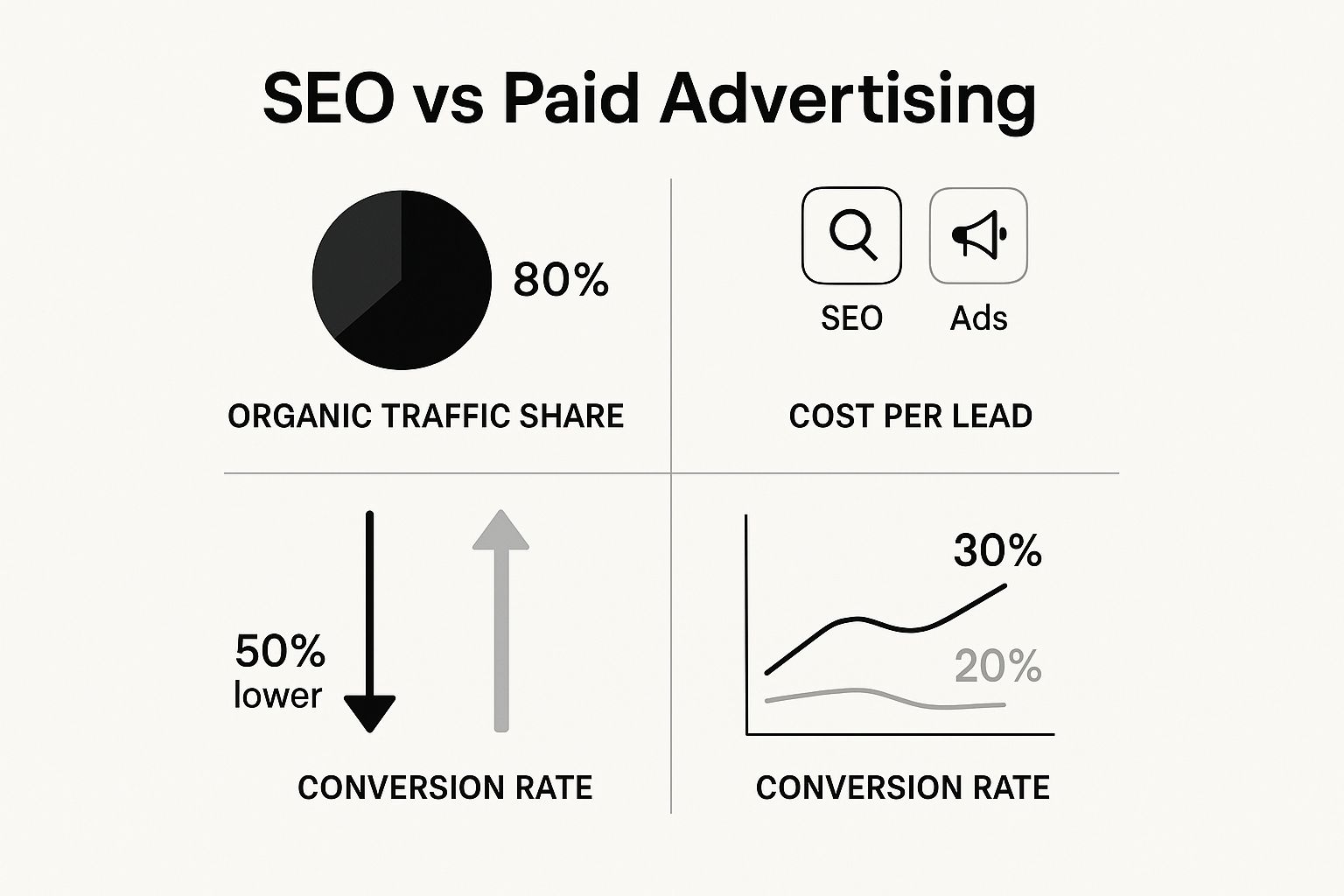
SEO for Financial Advisors: UK Client Acquisition Strategies
Understanding SEO Fundamentals for Your Financial Practice

Attracting new clients in the UK's financial services sector demands a strong online presence. Search engine optimisation (SEO) is no longer a supplementary marketing tactic, but a core component of client acquisition. It’s the key to ensuring your practice appears prominently when potential clients seek financial guidance online. This increased visibility translates into more qualified leads, often more cost-effectively than traditional methods.
Why SEO Matters for Financial Advisors
Think of SEO as a digital storefront for your practice. It helps potential clients discover you when they actively search for financial advice online. For instance, someone searching for "pension advice in London" is a far more promising lead than someone who passively sees your advertisement on public transport. This targeted approach is the heart of SEO's effectiveness.
A strong online presence cultivates trust and credibility. High search engine rankings signal expertise and professionalism, crucial in the financial services sector, where trust is paramount. This digital first impression can be the deciding factor for potential clients choosing your services.
In recent years, Google's dominance in the UK's financial services sector has been unwavering. It handles up to 90% of all search traffic, dwarfing emerging competitors. Despite the rise of AI-powered search, Google remains the primary channel for attracting new clients in 2025. With organic search driving over 50% of website traffic to financial advisory sites, SEO is indispensable for visibility and lead generation. Want more detailed statistics? Check out this insightful article: Is Your Financial Planning Website Ready for 2025 SEO? If your website isn't optimized, you're missing a substantial pool of potential clients.
Navigating the Challenges of SEO for Financial Advisors
While the potential of SEO is vast, financial advisors face specific challenges. The Financial Conduct Authority (FCA) has stringent regulations regarding financial promotions, and your SEO strategy must be compliant. This requires meticulous crafting of website content and marketing materials, avoiding misleading claims or unsubstantiated promises.
However, these regulations are not roadblocks, but opportunities to build trust and showcase your commitment to ethical practices. By adhering to these guidelines, you demonstrate professionalism and build confidence with potential clients.
The competitive landscape for financial keywords presents another hurdle. Many established firms and individual advisors compete for top search result rankings. This necessitates a targeted SEO strategy, focusing on specific niches and geographic areas. Specializing in retirement planning for NHS employees? Your keywords should reflect that. This focused approach enables you to compete effectively against larger firms with broader offerings. A well-executed SEO strategy is the key to unlocking significant growth for your financial advisory practice.
Keyword Research That Drives Qualified Client Inquiries

The infographic above paints a clear picture of SEO's power. It compares organic traffic share, cost per lead, and conversion rates between SEO and paid advertising. The results? SEO delivers a significantly larger share of organic traffic at a lower cost, with a higher conversion rate to boot. This underscores the importance of a robust SEO strategy for financial advisors. At the heart of any successful SEO campaign lies effective keyword research. Unfortunately, many advisors miss the mark by targeting the wrong terms.
Your keyword strategy shouldn’t focus on industry jargon. Instead, it should reflect the language your ideal clients use when searching for financial advice.
Identifying Your Ideal Client’s Search Terms
Think about it: a retiree in Edinburgh is more likely to search for "best pension advisor near me" than "retirement income distribution strategies." This distinction is crucial. Keyword research must go beyond technical terms and embrace the everyday language of your target audience. A great starting point? Brainstorm the questions your clients ask most often. These questions frequently translate directly into valuable keywords.
Balancing High-Volume and Long-Tail Keywords
Competitive keywords like "financial advisor London" attract high search volumes, but they also come with intense competition. That's where long-tail keywords shine. These longer, more specific phrases, such as "financial advisor for first-time home buyers in Bristol," attract less traffic but offer significantly higher conversion rates. They target users actively seeking your specific services, increasing their likelihood of becoming clients. Finding the right balance between high-volume and long-tail keywords is essential for maximizing your reach and conversion potential.
Understanding Search Intent
Every search tells a story. Someone searching for "what is inheritance tax" has a different intent than someone searching for "inheritance tax advisor Manchester." The former is an informational query, seeking knowledge. The latter is a commercial query, signaling a readiness to engage an advisor. Recognizing this difference allows you to tailor your content strategically. Target specific keywords that attract clients ready to take action.
Local SEO Considerations for UK Financial Advisors
For UK financial advisors, local SEO is paramount. Target regional variations by incorporating location-based keywords like "financial planning services Birmingham" or "investment management Leeds." Think about local financial planning needs, too. For example, advisors in university towns could target students and young professionals with keywords related to student loans or early-stage investing.
Building Keyword Clusters Around Core Services
Organize your keywords into strategic clusters based on your core services. For instance, a cluster around "pension planning" might include long-tail keywords like "SIPP advice," "defined benefit pension transfer," and "pension drawdown options." Create similar clusters for investment advice and tax planning, ensuring your website content comprehensively addresses each topic.
To help you visualize different keyword categories and their respective search intent and difficulty levels, take a look at the table below:
Financial Advisor Keyword Categories and Examples
| Keyword Type | Example Keywords | Search Intent | Competition Level |
|---|---|---|---|
| Generic | financial advisor, investment management | Informational/Navigational | High |
| Long-Tail | financial advisor for doctors in London, retirement planning for expats | Commercial/Transactional | Medium |
| Local | financial advisor near me, best financial advisor Bristol | Local | Medium |
| Informational | what is a SIPP, how to invest in ETFs | Informational | Low |
This table highlights the diverse range of keywords available to financial advisors. By strategically selecting keywords across these categories, you can effectively target different stages of the client journey.
By focusing on the right keywords, you attract qualified leads actively searching for your expertise. This targeted approach transforms website visitors into loyal clients, building a thriving practice.
On-Page Optimisation That Converts Visitors to Clients

On-page optimisation is where SEO truly makes a difference. It's about making your website a powerful engine for growth, not just an online presence. This means moving beyond the basics and building a user experience that turns visitors into valued clients.
Crafting Compelling Title Tags and Meta Descriptions
Think of your title tags and meta descriptions as your website's first impression. They're what potential clients see in search results. A title tag like "Financial Advisor London | Bespoke Wealth Management" is far more inviting than a generic "Financial Services." Your meta description is your chance to shine, highlighting what makes you unique and encouraging clicks. It’s a concise and powerful introduction to your services.
FCA-Compliant Content Creation
Engaging content is essential for attracting clients. For financial advisors in the UK, this content must also meet FCA regulations. This requires a careful balance: providing valuable information while adhering to strict guidelines. For example, avoid promising specific returns or using language that could be misconstrued as financial advice. By achieving this balance, you ensure your content is both discoverable and compliant.
Structuring Your Website Architecture for Conversions
Your website's structure should guide visitors seamlessly towards becoming clients. Create a clear path from general information to your specialized services. Start with broader categories like “Financial Planning,” then delve into specifics like "Retirement Planning" and “Investment Management.” This logical structure helps visitors quickly find what they're looking for, increasing engagement and the potential for conversion.
Advanced Internal Linking Strategies
Internal linking – connecting pages within your website – is more than just good navigation; it's a powerful SEO strategy. It strengthens your site’s authority and encourages visitors to explore further. Linking a blog post about "ISAs" to your "Investment Management" service page, for example, can keep visitors engaged and learning more about your expertise. This builds trust and moves them closer to becoming clients.
Optimising Service Pages for Client Conversion
Each service page should be optimized for relevant financial planning topics that resonate with your target audience. Address their concerns directly and build trust by showcasing your qualifications and client testimonials. This targeted approach ensures your pages appear in search results when potential clients are actively searching for your services. Focus on providing solutions, not just listing services. By addressing client needs and building confidence, you turn website visitors into loyal clients.
Content Marketing That Builds Authority and Attracts Clients
Content marketing is essential for effective SEO for financial advisors. However, simply creating blog posts isn't enough. You need a strategic approach to create valuable content that resonates with your target audience, ranks well in search engines, and ultimately attracts new clients.
Developing Content Topics That Address Client Concerns
Understanding your ideal client’s most pressing financial concerns is the first step. Consider their frequent questions and biggest financial anxieties. Are they worried about retirement planning, the complexities of inheritance tax, or investing for the future? These questions can inspire highly relevant content topics. By directly addressing these concerns, you position yourself as a trusted source of information and a valuable resource.
Balancing Educational Content With Subtle Promotion
Your content should primarily educate and inform, not overtly sell. Focus on providing genuine value to your audience. For example, a blog post about "Understanding Pension Options in the UK" can educate readers about different pension schemes without directly promoting your services. Subtly highlight your expertise by mentioning your experience working with clients on similar issues. This builds trust and encourages readers to consider your services when they're ready.
Creating High-Performing Content for Financial Advisors
Certain types of content perform exceptionally well for financial advisors. Comprehensive guides, like a detailed explanation of "Investing in ISAs," establish you as an expert. Timely articles, such as a piece on recent "Tax Changes and Their Impact on Your Investments," demonstrate your awareness of current financial trends. This content builds credibility and attracts clients actively seeking up-to-date financial information. Learn more in our article about How to master digital marketing for financial services.
Evergreen Content and Content Updates
Evergreen content, which remains relevant over time (like “Understanding Investment Risk”), continues attracting visitors long after publication. This provides long-term value and contributes to your overall SEO efforts. However, even evergreen content benefits from occasional updates. Revisiting and updating older content maintains its relevance and can improve its search rankings.
Frameworks for Accessible and Expert Content
Creating accessible content is vital, even when discussing complex financial matters. Use clear language, avoid jargon, and illustrate abstract concepts with real-world examples. Analogies can be powerful tools. For example, comparing investment diversification to "not putting all your eggs in one basket" simplifies the concept. By providing accessible and expert content, you build trust and demonstrate your expertise. You might be interested in: How to master digital marketing in the financial sector. This approach fosters credibility and ensures your website remains a valued resource for clients.
Technical SEO Essentials That Support Client Acquisition

Solid technical SEO is the bedrock of any thriving financial advisor website. It creates a positive user experience and allows search engines to efficiently crawl and index your site. These technical components directly impact your search rankings, the trust you build with clients, and ultimately, your firm's success.
Website Speed and Mobile Optimization
A fast website is no longer a luxury, it's a necessity, especially with the increasing number of people searching for financial services on their mobile devices. Page speed significantly influences both your search ranking and the experience a user has on your site. Imagine a potential client trying to access your insights during their lunch break, only to find a slow-loading website. Frustration mounts, and they're likely to look elsewhere for the information they need.
Optimizing your website for speed isn’t just a technical box to tick; it’s a crucial part of your client acquisition strategy. Furthermore, Google uses mobile-friendliness as a ranking factor. As more and more people use their smartphones to seek financial guidance, a responsive website that’s easy to navigate on any device is paramount. Investing in a mobile-first design approach is essential for connecting effectively with your target audience.
URL Structure and Site Navigation
A clear and well-organized site structure, reflected in logical URLs and intuitive navigation, benefits both your users and search engines. Your URLs should be descriptive and easy to understand, incorporating relevant keywords where appropriate. A URL like yourwebsite.co.uk/retirement-planning/sipps speaks volumes more than a jumbled string of characters, offering clarity for both users and search engines.
Intuitive site navigation allows visitors to quickly find the information they’re seeking. This positive user experience helps search engines understand the structure and hierarchy of your content. Clear navigation enhances usability and creates a smooth user journey, ultimately boosting the potential for client conversions.
SSL Certificates and Security Measures
Security is absolutely essential for any financial website. SSL certificates, indicated by the padlock icon in the browser bar, encrypt the data transmitted between the user’s browser and your website. This builds trust by protecting sensitive client information and is a key factor in how Google ranks your site. Displaying an SSL certificate isn’t just about meeting technical requirements; it’s a visible symbol of trustworthiness and professionalism.
Regular security scans and strong data protection protocols further bolster client confidence and protect your website from online threats. This proactive approach to security demonstrates a commitment to protecting client data and can positively influence search engine rankings. You might be interested in: How to master SEO for Financial Services.
Indexability and Crawlability
Search engines need to be able to easily access and interpret your website's content. This is where indexability and crawlability are vital. Ensuring your site is properly indexed allows search engines to find and categorize your pages, making them show up in search results. Crawlability refers to how easily search engine bots can navigate the structure of your site.
Using a well-structured sitemap and a robots.txt file (to guide search engine bots) improves both indexability and crawlability. This makes all your valuable content discoverable by search engines, enhancing your overall SEO performance. These technical elements play a major role in your website's visibility and its ability to attract clients through organic search.
Local SEO Strategies for UK Financial Advisors
Imagine connecting with clients in your local UK area with ease. Local SEO offers this distinct advantage for financial advisors, often presenting less competition than broader national keywords. This section explores practical strategies to amplify your online presence within your community.
Optimising Your Google Business Profile
Your Google Business Profile (GBP) is your virtual doorway, welcoming potential clients from Google Maps and search results. A fully optimized GBP is the cornerstone of local client acquisition. Ensure your profile showcases accurate and current information: your business name, address, phone number (NAP), website link, and operating hours.
Select the most appropriate business categories that truly represent your specialized services. Consider options like "Financial Planner," "Investment Advisor," or "Pension Consultant." Elevating your profile further, add high-quality images of your office space and team. This visual touch can significantly enhance appeal and encourage connections.
Building Local Citations and Managing NAP Consistency
Local citations, or online mentions of your business NAP, play a vital role in local SEO. Maintaining consistent NAP information across all online platforms builds trust with search engines, much like a consistent reputation builds trust within a community.
Think of Google as a diligent researcher, verifying your business information across multiple reputable sources. This consistent presence reinforces your legitimacy and boosts your local search ranking. Conversely, inconsistent NAP information can create confusion and potentially hinder your ranking progress.
Encouraging and Managing Client Reviews
Online reviews are powerful testimonials, offering social proof that influences potential clients. Encourage satisfied clients to share their positive experiences through reviews on your GBP and other relevant platforms like Trustpilot.
Responding to reviews, both positive and negative, demonstrates your commitment to client satisfaction. This proactive engagement nurtures trust and showcases your responsiveness to valuable feedback.
Creating Location-Specific Content
Connect with your local audience by creating content that resonates with their specific needs and concerns. If you're based in Birmingham, for instance, tailor content to address the financial landscape of Birmingham residents. Consider topics like "Retirement Planning for Birmingham Professionals" or "Investing in Birmingham's Property Market."
Avoid duplicating content across location pages. Instead, offer unique insights and information tailored to each specific region. For a deeper dive into local SEO for UK businesses, explore our comprehensive guide: Boosting Your UK Business With Local SEO for Small Businesses. This targeted approach strengthens your local search ranking and fosters meaningful connections within your community.
Leveraging Local Partnerships and Community Involvement
Building authentic relationships within your local business community and actively participating in local events can unlock valuable local backlinks. These links from reputable local organizations not only strengthen your online presence but also enhance your credibility within the community.
Imagine partnering with a local accountant or solicitor, exchanging backlinks that benefit both your websites' visibility. Active community involvement further demonstrates your commitment to the local area, building trust and attracting potential clients who value local engagement.
To help illustrate the importance of various Local SEO factors, let's take a look at the following table:
Local SEO Ranking Factors for Financial Advisors
Data showing the relative importance of different local SEO elements
| Ranking Factor | Importance Level | Implementation Difficulty | Impact Timeline |
|---|---|---|---|
| Google Business Profile Optimization | High | Low | Short-term & Long-term |
| NAP Consistency | High | Medium | Long-term |
| Client Reviews | High | Medium | Long-term |
| Location-Specific Content | Medium | Medium | Long-term |
| Local Backlinks | Medium | High | Long-term |
As you can see, optimizing your GBP and ensuring NAP consistency are highly important and relatively easier to implement, offering both immediate and lasting benefits. While building reviews and local backlinks may require more effort and time, their long-term impact on your local SEO is significant. Creating location-specific content offers a valuable opportunity to connect with your target audience and solidify your position as a local expert.
Measuring and Improving Your SEO Investment Returns
SEO for financial advisors is a journey, not a destination. It demands consistent attention and refinement. This means looking beyond superficial metrics like page views and focusing on what truly matters: organic traffic that converts into qualified leads, and ultimately, clients. Let's explore how to effectively measure and improve your SEO ROI.
Setting Up Proper Tracking Systems
Knowing which SEO activities drive genuine client inquiries, not just website visits, requires robust tracking. Think of it like a bustling street: foot traffic is great, but sales are the ultimate goal. Your website needs to track conversions, not just clicks.
Implement conversion tracking in Google Analytics to monitor specific actions, like form submissions or phone calls from your website. This data reveals which keywords and content are driving valuable actions. For instance, are visitors from "pension advice Edinburgh" converting more often than those searching for "financial advisor UK"? This information is gold.
Utilizing Google Analytics and Search Console
Google Analytics and Google Search Console are essential tools. Analytics unveils user behavior: which pages they visit, how long they stay, and their location. This data helps identify areas for improvement, like high bounce rates. A high bounce rate suggests a disconnect between page content and user expectations.
Search Console provides insights into how Google perceives your website. It shows which keywords drive traffic, identifies technical SEO issues, and tracks your site's appearance in search results. This helps you understand what’s working and what’s not. For example, Search Console might reveal your site isn't mobile-friendly, a critical factor in today's mobile-first world.
Benchmarking and Tracking Progress
Setting meaningful benchmarks is crucial for tracking progress. Track key metrics over time, such as organic traffic growth, keyword rankings, and conversion rates. This allows you to measure the effectiveness of your SEO efforts and identify areas for improvement. Are your rankings for "financial planner London" improving? Is organic traffic growing month over month? A data-driven approach ensures continuous improvement.
Overcoming Common SEO Challenges and Plateaus
Financial advisors face unique SEO challenges, like the competitive landscape for financial keywords and the need for FCA-compliant content. Overcoming these requires tailored strategies. If you're struggling to rank for competitive terms like "investment advisor", consider focusing on long-tail keywords like "investment advisor for tech startups in Manchester." This targeted approach can yield better results.
Ranking plateaus are normal. If your progress stalls, reassess. Perhaps your content needs refreshing, your technical SEO needs improvement, or your backlink profile needs strengthening. Regularly reviewing and adapting your strategy is crucial for sustained growth.
Creating Comprehensive Reporting Systems
Demonstrating the clear ROI of your SEO investment is vital. Create regular reports showcasing key metrics and their impact on business growth. This data-driven approach highlights the value of SEO and reinforces its importance within your overall marketing strategy. A report showing a 20% increase in qualified leads from organic search is a powerful argument for continued investment.
A robust reporting system not only tracks progress but also highlights opportunities. Are certain keywords driving significantly more conversions? This insight can inform future content and keyword strategies. By showcasing tangible benefits, you secure buy-in for ongoing optimization efforts.
Ready to elevate your online presence and attract more clients? Blackbird Digital, a leading UK marketing agency specializing in SEO for financial advisors, can help. We offer bespoke strategies tailored to your specific needs, driving organic growth and enhancing your digital credibility. Visit us today to transform your online presence into a powerful client acquisition engine.




